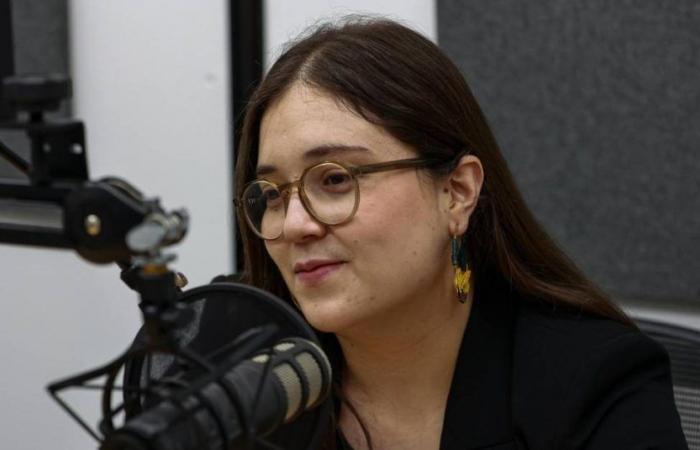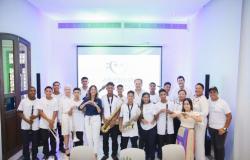06/24/2024
Ana María Patiño Osorio is one of the relevant names of the new generation of classical directors from Colombia. At less than thirty years old, she already has experience leading international and Colombian orchestras. Born in La Unión, Antioquia, and living in Switzerland, she is visiting the city to conduct the concert that the Medellín Philharmonic Orchestra will offer on Saturday, June 29 at the Metropolitan Theater at six in the afternoon. This musical event will have two moments. In the first, the Bulgarian and Venezuelan musicians of Filarmed will connect with the public thanks to a special presentation. Then, Ana María will conduct pieces by Beethoven, Dvořák and Carlos Medina.
You may be interested in: Symphonic conductors: a mountain miracle
Let’s start talking about his artistic and musical career…
“Well, I was born in 95, in La Unión. At five years old, more or less, my mother put me in music classes in the town and there I started playing saxophone, which is my usual instrument.”
And this is not a classical orchestral instrument, is it?
“No, it is not. I believe that if she played a normal orchestral instrument, she would have continued playing the instrument and would eventually be a conductor. I grew up playing saxophone, traveling around Colombia to go to many band competitions, having friends from many municipalities, getting to know all the towns in Antioquia. I had a very good music teacher since I was five years old, John Jairo Martínez, who always encouraged me to study music professionally. The direction always caught my attention. And during Holy Week, every Holy Thursday, the band from the University of Antioquia went to play at the Iglesia de la Unión. And I remember that my mother always took me. The directors caught my attention: I felt hypnotized by them.
I started conducting at home with imaginary musicians. Professor John Jairo gave me the first opportunities to direct when I was about 12, 13 years old. That motivated me a lot. Then, when I started studying music professionally, I won a competition to be in the National Youth Symphonic Band. From there they gave me a scholarship to study saxophone at Eafit, but I have always wanted to be a director. I continued playing the saxophone for a while, but I was already convinced to change my emphasis to conducting. I studied for a few months with teacher Cecilia Espinosa and then I continued with my mentor, teacher Alejandro Posada. I graduated from Eafit and then went to Switzerland to do a master’s degree. For two years I have been the assistant conductor of the Suisse Romande orchestra.”
I have noticed in the biography of many Antioquian musicians the importance of local churches and schools in their careers…
“Yes, they are very important. Teachers are very important in the municipalities. The teacher I had at La Unión taught us all to play all the instruments, we did everything and he did everything. And it turned out to be like a beacon for me forever. One cannot imagine at that time that education has such an impact on children and young people. Even though many are not professional musicians, music changed them. I grew up in a very healthy environment full of friends and experiences that could only happen to me through the symphonic band.”
What should a musician who aspires to direct an orchestra have?
“I think it’s a matter of purpose. What happened to me was that I really enjoyed playing saxophone, but I felt that I wanted to have a much more global approach to music, that wasn’t just about my instrument. Maybe no one can make music alone, but what happens with conducting is that you have a closeness to music that is universal. You have to understand all the instruments, of course. Also history, musical theory, and having great leadership, communication, and psychology skills. It is like a universal profession.”
You may be interested in: Antioquia es Mágica now has a new film tourism route
Let’s talk about the experience of being a director in Europe…
“It has been a very enriching experience. It’s been difficult, of course. I think I live the difficulties of being a migrant that happen to all of us. I had always greatly admired people who left the country to look for other paths and now that I have experienced it, I understand better the things that happen around me. It’s not simple. Of course, you have to be very emotionally prepared, especially for the challenges it brings. It is not easy either to be a young, Latina woman who makes the decisions of an orchestra that has been playing in a certain way for years and years and years. But as you learn more about yourself, you have more conviction. So, working with orchestras like the ones I’m working with has made me grow a lot, but I also think that being Latin, being Colombian, also gives me many advantages, I think. That gives me like fire, a lot of drive, in a way.”
I suppose that conducting a, say, Latin American orchestra, must be somewhat different from conducting a European orchestra…
“It’s different, from the language. Language is a fundamental thing, because it has a lot to do with how you think about music. I, of course, think what the music tells me in Spanish, which is my mother tongue, and I think that already opens a very important path. That, to begin with, is something important, because when you are rehearsing in other places, in other languages, it completely changes the way you see music. So, when I come to direct in Medellín, in Uruguay, in Peru, being able to express my ideas in Spanish is already something that gives me a lot of peace of mind, and more confidence.”
What is the particularity of the music, for example of the classical musicians from here in Antioquia?
“It’s very special. Coming to Filarmed means meeting a lot of friends again. So, it means listening to them again, but, as the years have passed, I have a different vision of many things. Here you feel vitality and desire to make music. If you inspire them and if you are with them, it is very easy to immediately receive great energy from them. This does not happen with all orchestras in Europe, there you have to move the energy a little more. Suddenly the weather has something to do with it. Medellín, being such a warm city, well the people are like that, warm. When you work with musicians from here you feel that warmth and the desire to play and you enjoy it much more.”






